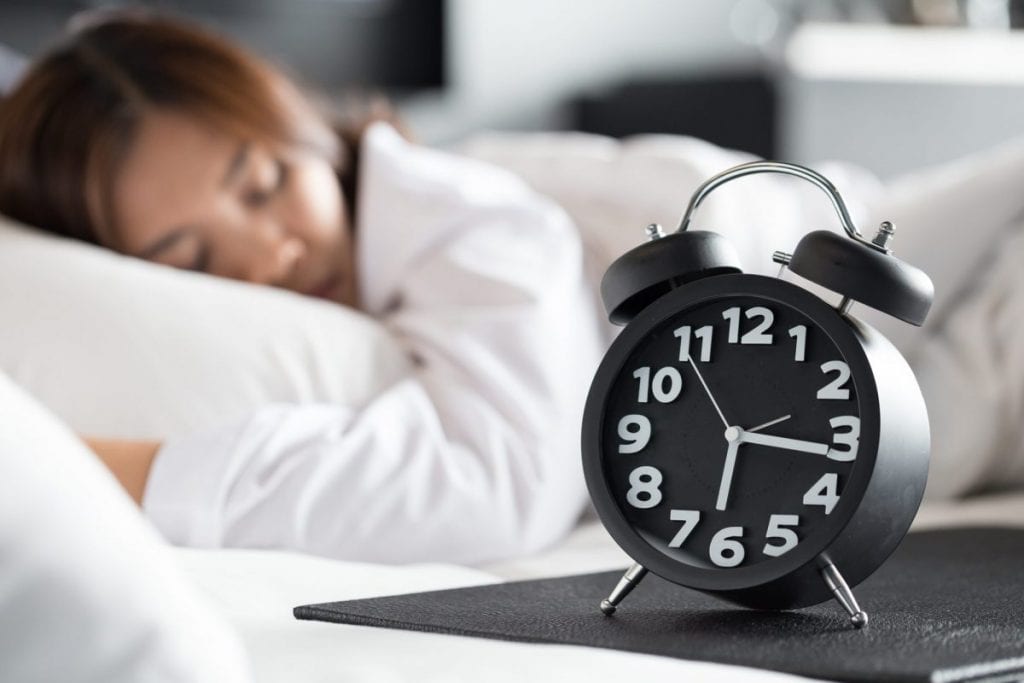Regular exercise and a balanced diet are two important factors for physical fitness, but also for physical and mental well-being. Another important consideration for a healthy body and effective training is healthy sleep. Because if the night’s rest is not restful, everyday life is also more difficult to cope with and performance decreases. Nowadays, rest periods are often neglected. Here are some useful tips on how to use sleep effectively so that you are fit for the next day.

Sport helps you sleep
Regular training has a positive effect on sleep, because when the body is challenged and stressed, a feeling of tiredness automatically sets in. After exercise, the muscles are tired and ready for regeneration, as a result, the organism subconsciously has a greater willingness to sleep. Sport therefore helps to optimize the daily sleep rhythm.
But be careful, If you start training late in the evening, you should take a rest before going to sleep. Shortly after training the muscles are still tense and the body remains ready for action. That’s why you should rest on the couch, for example, after your evening workout, so that your body can adjust before going to bed.
In general, rest breaks are important. Especially in the case of high intensity training, you should take a breather. If you train a lot every day, your body remains in a kind of alarm state. Then it is harder to get to rest. That is why regular training-free days – meaningfully integrated into the training plan – are just as important as the training itself. This not only improves your sleep, but also makes training more effective.
Training for a good night’s sleep
Relaxing sleep can be learned. The right “sleep hygiene” is important for this. This term covers all factors related to your sleep. These include sleep-wake rhythm, sleep environment and the ability to relax. Here are a few practical tips:
- The most important thing is a regular sleep-wake rhythm. The body gets used to the times when you get up or fall asleep. Therefore you should – as far as possible – always get up and go to bed at the same time. This rhythm is also best maintained at weekends. This allows the body to adjust to this cycle and automatically get tired at the right time of the night.
- In addition, you should only go to bed when you are really tired. Naps are to be enjoyed with caution, a power nap in the afternoon should not last longer than 30 minutes, otherwise you disturb your day-night rhythm.
- Your bed is for sleeping! You should avoid watching TV in bed, reading or surfing the internet. Because if you only use the bed to sleep, your subconscious mind knows that it’s time to to sleep when you go to bed. Therefore, your bedroom should be a room where you can feel comfortable and relax. Banish distractions from the bedroom. The optimal room temperature should be between 15 and 19 degrees Celsius (55 -66 degrees Fahrenheit). This provides more oxygen and prevents the nasal mucous membranes from swelling , keeping your airways free and preventing snoring.
- Caution should be exercised with regards to electronic devices. It has been proven that LED screens of many laptops and tablets can influence the day-night rhythm, because they can confuse the bodies melatonin balance. Your body thinks it is still day, although it has been dark for a long time. Therefore, put the devices away in time before the night’s rest.
If you have problems relaxing in bed, there are different relaxation exercises that you can learn. One of the best known is progressive muscle relaxation according to Jacobsen. Different muscle groups are stretched and relaxed one after the other. This gives the body a feeling of fatigue on the one hand, and on the other hand the concentration on the exercise helps to hide stress and racing thoughts.
You sleep how you eat
In addition to the positive effect on training and health, a balanced diet also helps you sleep better. If the body gets all the nutrients it needs, the metabolic processes can run more efficiently. These supplies must be refueled, otherwise the body attacks its reserves and that costs energy and diminishes the effect of training.
But too much of a good thing is not the goal either, because if you eat too much – especially before going to bed – the gastrointestinal tract is still busy with digestion and keeps you from sleeping. Therefore you should wait about two hours after eating before you go to bed so that there is enough time to process the food. Also avoid foods that contain a lot of fat and meat in the evening, as they take a particularly long time to digest.
Magnesium
As you probably know, magnesium is important in preventing cramps. Magnesium helps muscles to regenerate. Therefore, an adequate level of magnesium in the body is also important for sleep (especially after exercise). If the muscles can relax well, the whole body knows that it is time for rest and regeneration. This also makes it easier to fall asleep. You can also top-up your magnesium balance without food supplements, especially vegetables like spinach, beans and bananas contain a lot of magnesium.
Amino acids as a bedtime treat?
An important substance that helps regulate the sleep-wake rhythm in the brain is the messenger substance serotonin (also called “happiness hormone”). It contributes to feeling balanced and calm and helps to fall asleep and sleep through. Serotonin is produced in the brain from the amino acid tryptophan. As such, it is found in meat and also in various vegetables and dairy products. But for serotonin to be produced, tryptophan must first cross the blood-brain barrier. If you now eat meat, or take amino acids as a dietary supplement for training, you get tryptophan as well as all other amino acids. Then all the amino acids try to cross the blood-brain barrier at once and block each other’s paths. In order to increase your serotonin level, it makes sense to eat foods that have a high tryptophan content compared to other foods. These include bananas, cocoa, oat flakes, walnuts, eggs and cashew nuts.
Balancing training, diet and sleep are important to enhance your athletic development and performance.
Somnishop is dedicated to helping people sleep better. As experts in snoring and anti-snoring products, we offer you a wide range of state of the art technologies to counter snoring and improve your sleep. In addition we also supply an excellent range of high quality nasal dilators that improve your breathing during training.








